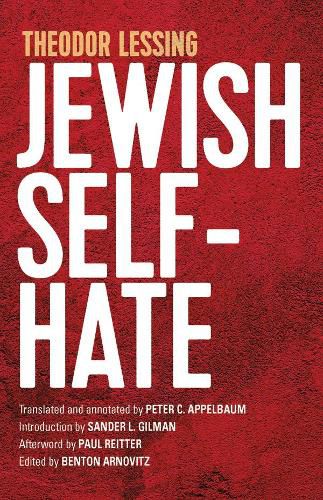Readings Newsletter
Become a Readings Member to make your shopping experience even easier.
Sign in or sign up for free!
You’re not far away from qualifying for FREE standard shipping within Australia
You’ve qualified for FREE standard shipping within Australia
The cart is loading…






This title is printed to order. This book may have been self-published. If so, we cannot guarantee the quality of the content. In the main most books will have gone through the editing process however some may not. We therefore suggest that you be aware of this before ordering this book. If in doubt check either the author or publisher’s details as we are unable to accept any returns unless they are faulty. Please contact us if you have any questions.
A seminal text in Jewish thought accessible to English readers for the first time.
The diagnosis of Jewish self-hatred has become almost commonplace in contemporary cultural and political debates, but the concept’s origins are not widely appreciated. In its modern form, it received its earliest and fullest expression in Theodor Lessing’s 1930 book Der judische Selbsthass.
Written on the eve of Hitler’s ascent to power, Lessing’s hotly contested work has been variously read as a defense of the Weimar Republic, a platform for anti-Weimar sentiments, an attack on psychoanalysis, an inspirational personal guide, and a Zionist broadside.
The truthful translation by Peter Appelbaum, including Lessing’s own footnotes, manages to make this book more readable than the German original. Two essays by Sander Gilman and Paul Reitter provide context and the wisdom of hindsight. -Frank Mecklenburg, Leo Baeck Institute
From the forward by Sander Gilman:
Theodor Lessing’s (1872-1933) Jewish Self-Hatred (1930) is the classic study of the pitfalls (rather than the complexities) of acculturation. Growing out of his own experience as a middle-class, urban, marginally religious Jew in Imperial and then Weimar Germany, he used this study to reject the social integration of the Jews into Germany society, which had been his own experience, by tracking its most radical cases…. Lessing’s case studies reflect the idea that assimilation (the radical end of acculturation) is by definition a doomed project, at least for Jews (no matter how defined) in the age of political antisemitism.
$9.00 standard shipping within Australia
FREE standard shipping within Australia for orders over $100.00
Express & International shipping calculated at checkout
This title is printed to order. This book may have been self-published. If so, we cannot guarantee the quality of the content. In the main most books will have gone through the editing process however some may not. We therefore suggest that you be aware of this before ordering this book. If in doubt check either the author or publisher’s details as we are unable to accept any returns unless they are faulty. Please contact us if you have any questions.
A seminal text in Jewish thought accessible to English readers for the first time.
The diagnosis of Jewish self-hatred has become almost commonplace in contemporary cultural and political debates, but the concept’s origins are not widely appreciated. In its modern form, it received its earliest and fullest expression in Theodor Lessing’s 1930 book Der judische Selbsthass.
Written on the eve of Hitler’s ascent to power, Lessing’s hotly contested work has been variously read as a defense of the Weimar Republic, a platform for anti-Weimar sentiments, an attack on psychoanalysis, an inspirational personal guide, and a Zionist broadside.
The truthful translation by Peter Appelbaum, including Lessing’s own footnotes, manages to make this book more readable than the German original. Two essays by Sander Gilman and Paul Reitter provide context and the wisdom of hindsight. -Frank Mecklenburg, Leo Baeck Institute
From the forward by Sander Gilman:
Theodor Lessing’s (1872-1933) Jewish Self-Hatred (1930) is the classic study of the pitfalls (rather than the complexities) of acculturation. Growing out of his own experience as a middle-class, urban, marginally religious Jew in Imperial and then Weimar Germany, he used this study to reject the social integration of the Jews into Germany society, which had been his own experience, by tracking its most radical cases…. Lessing’s case studies reflect the idea that assimilation (the radical end of acculturation) is by definition a doomed project, at least for Jews (no matter how defined) in the age of political antisemitism.